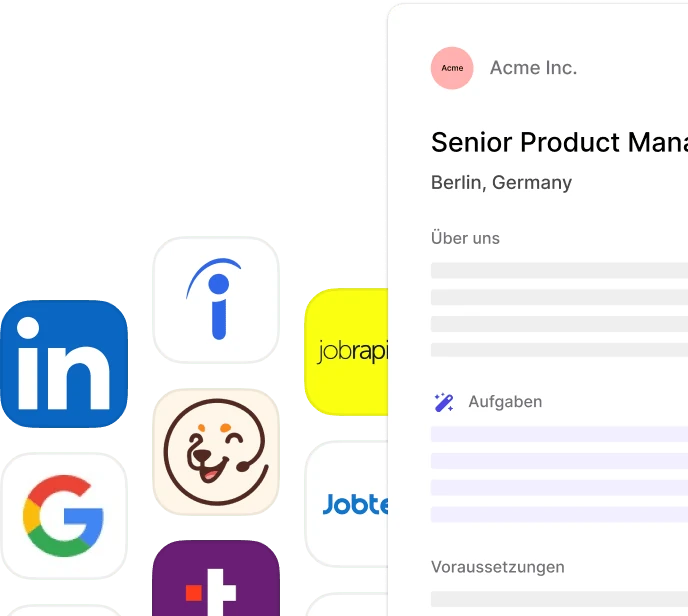How to hire employees from abroad
Table of contents
Are you looking to hire employees from abroad? Discover the benefits of a diverse workforce with international roots and what you should consider in the hiring process of international employees.
Hiring employees from abroad, also called global recruitment, is becoming increasingly popular (and important). Especially in times of labour shortages.
Companies that embrace diversity and international expertise can secure significant competitive advantages. This article will address the following topics:
Table of contents
Why should you hire employees from abroad?
You might think sticking to the domestic labour market when hiring new employees is easier. After all, the steps to hire and onboard an employee are familiar, everyone speaks the same language, and the path to payroll is practically automatic.
However, in times of skilled labour shortages, globalisation, and changing circumstances in other countries, more and more reasons emerge for hiring employees from abroad.
For example, companies can benefit from these employees’ country and market knowledge. As locals, they understand how the market responds, what aligns with cultural norms, and how to attract country residents as customers. Such insider knowledge should be leveraged by companies, especially when they aim to expand into the respective market. But that’s not all. By hiring employees from abroad, a company inadvertently broadens its field of expertise and can benefit from different types of education, specialities, and perspectives.
Consider this list of advantages and disadvantages of hiring employees from abroad:
Advantages and disadvantages of hiring foreign employees
| Advantages | Disadvantages |
|---|---|
| Cultural enrichment Growing expertise Specialised skills Long-term employee retention due to country change Market knowledge in the country of origin Higher recruiting chances Larger talent pool | Extended hiring process Bureaucratic effort Relocation costs Potential cultural differences |

How to find skilled workers from abroad
The trend in recruiting extends far beyond the borders of the EU. Particularly, startups are increasingly aiming to hire employees from non-EU countries.
To simplify your entry into international recruiting, we’ll focus on searching for employees within the European Union (EU) or the DACH region (Switzerland/Austria/Germany). After all, we here at JOIN are based in Berlin and have hands-on experience in hiring employees from abroad as a German-based company.
First, we recommend creating a checklist for hiring foreign employees. This ensures that no crucial point is overlooked and allows you to process your gathered insights in an organised manner.
Today, the recruiting process for employees in the European Economic Area or the EU hardly differs from recruiting in your own country. Especially with the already mentioned focus on the DACH region, you barely need to adjust your search process, since even the hurdle of language barriers has been removed.
Numerous online job platforms such as Stepstone, Indeed, Monster, and Google For Jobs are accessible across many European countries. And with JOIN’s multiposting tool, you can easily publish your job to these and 250+ more job boards all at once!
Hiring foreign employees directly in their own country is also becoming increasingly popular. This makes particular sense if you’re planning a branch or a German representation abroad.
Furthermore, you can work with freelancers or an Employer of Record. Keep this option in mind if you’re considering hiring employees from non-EU countries in the future. However, the following article will focus on hiring foreign employees for your company when based in Germany.
The hiring process for foreign candidates
When hiring foreign employees, there are several legal aspects to consider. Hiring employees from other EU countries does not require special prior knowledge, as they have the right to freedom of movement and can reside and take up employment in any EU state.
There is also a freedom of movement agreement between Switzerland and Germany, allowing Swiss citizens to be employed in Germany without significant obstacles.
Despite these simplifying laws, the following points should be considered and included in the checklist for hiring foreign employees.
Checklist: What do you need to consider when hiring foreign employees?
✔️ Work permits and visa regulations:
Work permits and visa regulations vary depending on the country of origin. Support your future employees in obtaining a work permit to ensure a smooth hiring process. Asylum seekers often find it more challenging to obtain a work permit, so its issuance in advance is mandatory.
✔️ Compliance with local labour law:
Ensure your newly acquired team members are well-informed about local labour law. Depending on their country of origin, they may be accustomed to different working hours and might inadvertently bring these work habits into your company. Your role as an employer includes educating about labour law and the conditions within your company. Feel free to refer potential candidates to the German foreign representation in their country of origin at the beginning of the process, so they can extensively inform themselves about Germany and German rights.
✔️ International tax and social security regulations:
This is probably the most complex issue when hiring employees from abroad and requires country-specific knowledge. The agreements between the EU and Switzerland clearly outline where taxes must be paid and where the employee is ultimately covered by social insurance. A significant difference arises if employees live in Germany but work abroad, or vice versa. Cross-border commuters are employed in Germany but return to their place of residence in a neighbouring country after work.
How to hire employees from abroad?
In our step-by-step guide, you’ll learn how to hire employees from abroad in 5 simple steps:
- Step 1: Needs analysis and job description
Formulate a clear definition of the future role and the necessary skills. Your job advertisement can also explicitly invite applicants from neighbouring countries. Don’t forget to list all essential information about your benefits (such as home office or other remote work options). - Step 2: Sourcing and recruiting
Use global networks and platforms to find the best talents. By using screening questions, you can carefully pre-select beforehand to conduct job interviews efficiently. Offer to cover travel expenses for a personal interview or plan to conduct the initial interviews online. - Step 3: Evaluation and selection
When conducting interviews, assess skills and qualifications and find common ground with your candidates. Also, clarify whether the qualifications obtained are recognised in Germany. The first personal impression can quickly indicate whether the potential employee is flexible enough to adapt to a new labour market and its conditions. Assessments can help in evaluating your candidates. - Step 4: Visa and immigration processes
Support your new employees in understanding the necessary steps and initiate the procedures in a timely manner. Particularly for non-European employees, the visa process is inevitable, but new employees from Switzerland, despite the freedom of movement agreement, need a residence permit. - Step 5: Onboarding
Through onboarding, lead and integrate your new employees into your company. Take cultural differences into account. The key feature of successful onboarding is transparent communication between you and your new employees. Find a balance between accommodating adjustments to the cultural habits of the new team member and introducing them to the prevailing procedures and customs. Onboarding can make or break the beginning of a collaboration.
Additional tips for building a diverse and international team
The following tips are relevant during onboarding for developing a successful, diverse, and international team. However, these tips can also facilitate the strengthening of international and diverse teams beyond the onboarding process:
Adapting to different cultures:
Understanding cultural differences is crucial for successful integration. Sufficient space should be given to this at the beginning until the new employees have adjusted to the new conditions and ideally embraced them or grown into them.
Overcoming language barriers:
Language support and training can ease integration. Even the varied linguistic nuances within the German-speaking area can lead to misunderstandings. When in doubt, it’s always a good idea to ask again.
Support with relocation:
Assistance in finding housing, dealing with official procedures, and social integration is important for many foreign employees. Here, too, German foreign representation in the respective neighbouring countries can be helpful.
Hiring foreign employees offers numerous opportunities for companies but also brings challenges. Careful planning, knowledge of legal regulations, and a deep understanding of intercultural differences are crucial for success. With the right strategy and preparation, companies can benefit from the diversity and expertise of international talents.
Frans Lelivelt
Frans is JOIN's multilingual Senior Content Manager. His main topic of interest in the recruitment space is DEI and how companies can reduce their (unconscious) biases to make the world of work a fairer, kinder place for everyone. Outside of work, he tries to do the same for animals, spending much of his spare time in the kitchen preparing plant-based feasts.



